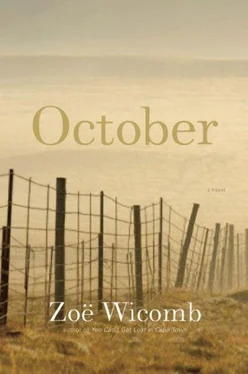And now, how that self-belief wags a mocking finger. The scholarship in Scotland that was meant to be no more than a break from the oppressiveness of home led to Craig and lifelong exile. From the start Craig was for keeps. After all the short-lived, disappointing dalliances with unsuitable young men, she knew that this was different. And Craig was not afraid of saying it out loud, as he playfully — touch wood — knocked on her head: we are for keeps. Which even allowed her a year of research in the USA and for him, traveling in Europe. Theirs was not the kind of relationship that restricted each other. And fortunately for both, having groped their way through childhood and adolescence, they were sure that they wanted no children of their own.
Apartheid meant that there were no discussions about where they would live, about which one of them would give up his or her home. Thereafter, Craig was evasive about emigrating. It was only sensible to wait and see how things developed, and Mercia, by then engrossed in her work, was patient, and did not note how time had crept up on them, for they were what is known as a happy couple. What then had gone wrong? Where and how had she failed? Mercia has gone over the questions too many times. She must accept that the condition of having been left is about being left with unanswerable questions. Like flies to wanton gods etcetera, or plain old shit happens, as they say these days. She is sure that the question of how things had gone wrong would not have detained Craig. His concern was the setting to rights: the new woman, necessarily younger, who had somehow slipped into his life, and made the old intolerable, expendable. All he needed to worry about was the mechanics of replacement, how to sever things in a civilized, sophisticated fashion, without the messiness of tears and howling hysteria. Mercia thinks enviously of Sylvie, who, when she finally accepts her rejection, will hurl herself at the heavens, rail and rage and tear Jake apart. How satisfying, how cathartic that must be.
Mercia sits up straight. She must not think of herself as an abandoned woman, an old woman, whose thighs have spread and who sits with her legs comfortably apart, hands folded on her stomach. It is that image that drives her, reluctantly, to the gym. It has irritated her that even Smithy has read her visits to the gym in terms of a quest for a new man.
Don’t be ridiculous, she snapped, there are ways of overcoming loneliness without burdening yourself with a strange burk. I’m warding off osteoporosis, that’s all. Oh, and a potbelly too.
Well, that’s wonderful, Smithy said with her usual clapping together of hands, no need then for me to have a sign made for the rear window of your car: Abandoned woman at the wheel.
Together they had laughed at the ludicrous warnings on cars. It was important to Mercia that Smithy, a bona fide mother, agreed on the Child on Board signs. What on earth could such complacent parents have in mind? How naïve the belief that otherwise reckless drivers would slow down in deference to their parenthood. Did they not know that it made any sensible person want to crash right into them and their precious brats?
Mercia flicks once more through the photographs. It is not, she consoles herself, like reading someone’s letters, which she would never do. Photographs are already public, already an objectification of the person, meant to be looked at, so that she cannot see why anyone should mind; indeed, Sylvie presumably wants them to be admired. These pictures are all of Sylvie, taken by Sylvie herself, as if she is alone in the world, not lonely, just the only one left, having shooed everyone else out of the way to celebrate her aloneness.
There is one of her in a butcher’s shop surrounded by sausage that she surveys with pride, pleased as punch at the fine career of butchery ahead of her. Mercia stops at another of the girl leaning against the kitchen wall that had been painted in bands of sky blue and grass green, no doubt, from the flaunting look, her own, recent handiwork. The old Willemse sisters must by then have been too tired to care. Provocative, all the pictures, with a pouting sexuality and devil-may-care stance that cannot be imagined from the careworn Sylvie of today. Mercia looks more closely. Yes, there it is in the corner, the edge of a set of shelves clad in lacy fabric. It does not seem like newspaper cutout; rather, white oilcloth she thinks, with pretty scalloped edges, nicely referencing the old newspaper.
Mercia is about to shove the photographs back into the envelope when her eye catches one in black and white, a curious picture, taken at night, with the girl in a white T-shirt rising ghostly out of placeless darkness. The foreground on the right is a solid black blur, probably a rock on which the camera has been positioned, for a jagged stone edge, having caught the lens, is projected as a shadow onto the girl’s white T-shirt. Sylvie is positioned behind an old wire fence just visible on the left as a few hexagons of chicken wire. Loosely strung above it is a slack line of barbed wire, which cuts across her chest. Her torso is slightly angled; her right ear catches the camera’s flash, as do her teeth, shown in a stiff, artificial grin.
Out of the darkness behind the girl, the only form picked out by the flash is the outline of a tree, so strange and stark and otherworldly that it appears as the negative of an image, its bare branches bearing unreal clusters of broad leaves here and there. Might it be a wild fig? Above the tree, to the right, and at the top of the photograph is an effulgent patch of light in the sky. Mercia does not know enough of the night sky; she would like to think that it is the heavy luminosity of the Milky Way.
The photograph is extraordinary. It is of a Sylvie whom Mercia does not know and cannot fathom. A strange young woman in knowing performance who claims for herself an iconic presence in the ethereal light, then subverts it with a grin. Or is it an ironic grimace? The light in the sky, resonating as it does with the eerie, flashlit figure, might almost be an aureole cut adrift, carelessly tossed into a painterly scene, and askew in its ascent to heaven. Sylvie’s loose white T-shirt, rising out of black rock where the camera must have been placed, displays below the barbed wire the outline of a target printed in black lines across her chest. For all the girl’s lack of education, the photographic figure is imbued with language: I am alone in the world; I cannot be touched; I am transfigured.
The barbs of the wire bore through her T-shirt, sink into her flesh, into this representation of Sylvie the saint who will pluck out the barbs without flinching. Sylvie the invincible.
What is it that the girl knows? There is more than self-reflexivity, something beyond the knowing aesthetics of representing the self. There is knowledge that crosses over from the ghostly world of the photograph, that flicks across eerily into the real, now a flickering shadow across Mercia’s heart. A shadow of fear and awe. Who is this apparition who rises out of the darkness, whose bright, ironic grin haunts the viewer? Who is Sylvie?
Mercia shoves the photographs back into the envelope just in time. She has not heard the click of the gate, the crunch of footsteps, until the girl struggles noisily, heavily into the house with a newspaper parcel that she draws out of a shopping bag. After the ethereal picture, the solid figure and drawn mouth seem to exude a bitterness that makes Mercia flinch.
A lekker brawn for tomorrow, Sylvie announces. Some tripe and trotters.
Does the girl think of nothing but food? No wonder she has grown so heavy. How can it be that there is no trace of the extraordinary figure of the photographs? Then Mercia screams involuntarily as Sylvie unwraps the newspaper parcel and triumphantly holds up a scraped sheep’s head, its eyes staring glassily out of the mottled gray-black skin. Sylvie throws her head back with laughter. It’s only a sheep’s head. I’m going to cook it with the trotters for brawn. Very nice, flavored with a bit of curry powder, and it’s something that Jake really likes. You’ll see how he’ll jump out of bed for brawn. She looks up at Mercia’s frozen face. What’s the matter, she says, you must have seen a sheep’s head before? There is unmistakable scorn in her voice, so that Mercia does not trust herself to reply. Then, seeing the child asleep on the sofa, Sylvie shouts, Ag no, man, this is no time to be sleeping. She shakes his shoulder until his eyes open. This reading and writing business is too much for him, too tiring for a small boy, she says.
Читать дальше












